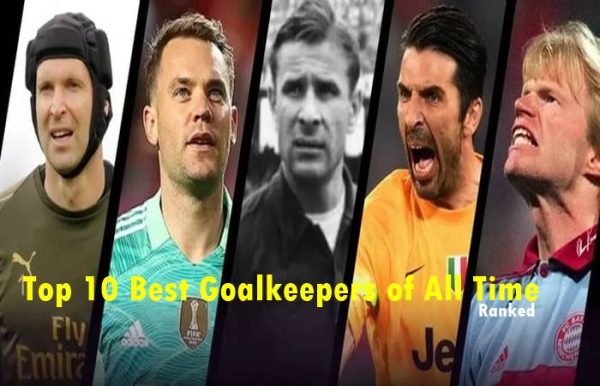
Goalkeepers: The Ultimate Last Line of Defense and Game Changers.
Goalkeepers are the unsung heroes of football, the last line of defense who can turn the tide of a match with a single save. While strikers get the glory for scoring goals, it’s often the goalkeepers who make the difference between victory and defeat. Over the decades, the greatest keepers have not only been shot-stoppers but also leaders, organizers, and even playmakers. They combine lightning-fast reflexes with unshakable mental strength, often carrying their teams through crucial moments when the pressure is at its highest.
What separates the good goalkeepers from the all-time greats? It’s not just about making saves—it’s about consistency, longevity, and the ability to perform when it matters most. The best goalkeepers of all time have redefined the position, setting new standards and inspiring future generations. Some have revolutionized how the role is played, while others have simply been so dominant that they became the benchmark for excellence.
But Who Truly Stands Above the Rest?
Ranking the greatest goalkeepers in history is no easy task. Different eras, playing styles, and team strengths make direct comparisons difficult. However, after careful consideration, we’ve evaluated the top shot-stoppers based on four key criteria:
-
Trophies Won – Success at the highest level matters. We looked at major titles like Champions Leagues, World Cups, and domestic league triumphs, as well as individual honors such as the Ballon d’Or (only won by one goalkeeper, Lev Yashin) and FIFA Best Goalkeeper awards.
-
Career Longevity – Being world-class for a few years is impressive, but maintaining that level for a decade or more is what separates the greats from the legends. Players like Gianluigi Buffon (who played at an elite level for nearly 30 years) and Iker Casillas (who remained a force for two decades) set the standard for longevity.
-
Big-Match Performances – The best goalkeepers rise to the occasion in finals, derbies, and high-pressure knockout games. Think of Thibaut Courtois’s heroics in the 2022 Champions League final, or Iker Casillas’s clutch saves in Spain’s 2010 World Cup triumph. These moments define legacies.
-
Innovation & Influence – Some keepers didn’t just excel—they changed the game. Manuel Neuer transformed goalkeeping with his “sweeper-keeper” style, while Lev Yashin set the foundation for modern shot-stopping in the 1960s. Their impact extends beyond statistics.
How We Ranked the Greatest Goalkeepers Ever
Before diving into the top 10, it’s important to understand how we assessed these legends. Here’s a deeper look at our evaluation process:
1. Trophies & Honors
Winning is the ultimate measure of a goalkeeper’s success. We considered:
-
Major club trophies (Champions League, domestic leagues, cups)
-
International success (World Cup, continental championships)
-
Individual awards (Ballon d’Or, FIFA Best Goalkeeper, Golden Gloves)
Goalkeepers like Iker Casillas (3 UCLs, World Cup, 2 Euros) and Oliver Kahn (Champions League, multiple Bundesligas) stand out not just for their skills but for their trophy cabinets.
2. Longevity & Consistency
A great goalkeeper isn’t just about one or two amazing seasons—it’s about delivering year after year. We looked at:
-
Peak performance duration (How many years they were among the world’s best)
-
Age-defying excellence (Buffon was still world-class at 40)
-
Adaptability (Could they evolve with the game? Neuer did.)
Players like Edwin van der Sar (who starred for Ajax, Juventus, and Man Utd across different eras) proved that true greatness lasts.
3. Big-Match Performances
The best keepers deliver when the stakes are highest. Key factors included:
-
Final performances (Schmeichel in Man Utd’s 1999 UCL win)
-
Tournament heroics (Kahn in the 2002 World Cup)
-
Penalty-saving prowess (Čech’s record in shootouts)
A single iconic save (like Gordon Banks’s stop against Pelé) can define a career.
4. Innovation & Influence
Some goalkeepers didn’t just play the position—they reinvented it. We examined:
-
Tactical impact (Neuer’s sweeping changed modern goalkeeping)
-
Technical evolution (Yashin’s aggressive style in the 1960s)
-
Legacy (Did they inspire future generations? Buffon certainly did.)
Now, Let’s Meet the Top 10 Greatest Goalkeepers of All Time
With these criteria in mind, we’ve compiled the definitive ranking of the best goalkeepers in football history. From legendary World Cup winners to revolutionary modern keepers, these are the players who have left an indelible mark on the game.
10. Gordon Banks (England) – The Save That Defined a Career
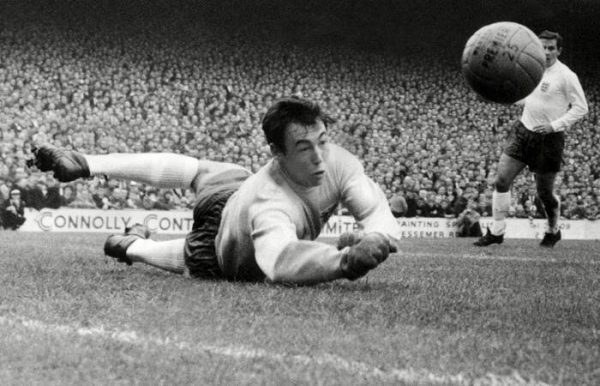
Gordon Banks stands as one of England’s greatest ever goalkeepers and a true legend of the game. His career spanned from the late 1950s through the 1970s, with his peak coming during England’s 1966 World Cup triumph. While Banks didn’t have the trophy-laden club career of some other goalkeepers on this list, his international achievements and iconic moments cement his place among the all-time greats.
Banks made his name at Leicester City before moving to Stoke City, where he spent the majority of his club career. At international level, he was England’s undisputed number one during their golden era, earning 73 caps between 1963 and 1972. His most famous achievement came in 1966 when he was an integral part of England’s World Cup-winning team, keeping clean sheets in the quarterfinal and semifinal before England’s famous final victory over West Germany.
However, Banks’ legacy was truly defined by what became known as “The Save of the Century” during the 1970 World Cup in Mexico. Facing Brazil and the legendary Pelé, Banks somehow managed to push a seemingly certain goal over the crossbar from point-blank range, a stop that defied physics and remains perhaps the most famous save in football history. Pelé himself immediately applauded the save and later called it the greatest he had ever seen.
Tragically, a car accident in 1972 cost Banks the sight in one eye and effectively ended his career at the highest level, though he did make a brief comeback in the North American Soccer League. His influence on English goalkeeping remained strong through coaching and mentoring young keepers until his passing in 2019.
9. Alisson Becker (Brazil) – The Modern Wall
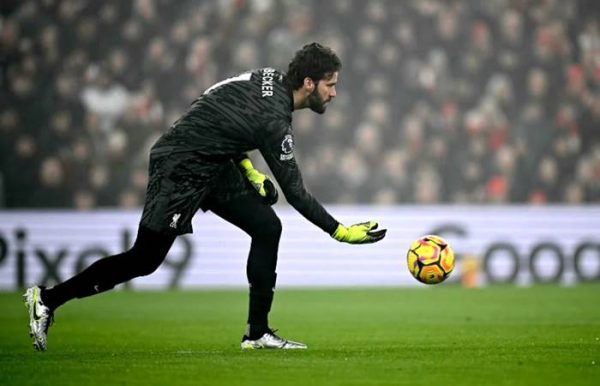
Alisson Becker represents the modern evolution of goalkeeping, combining traditional shot-stopping ability with excellent distribution and composure under pressure. Since bursting onto the scene with Internacional in Brazil, Alisson has established himself as one of the world’s best goalkeepers during spells with Roma and Liverpool.
The Brazilian international made his European breakthrough at Roma, where his performances earned him a then-world record transfer for a goalkeeper to Liverpool in 2018. At Anfield, he quickly became the final piece in Jürgen Klopp’s puzzle, helping transform Liverpool from contenders to champions. His crucial saves in the 2019 Champions League final against Tottenham and throughout Liverpool’s Premier League title-winning 2019-20 campaign demonstrated his ability to perform when it mattered most.
What sets Alisson apart is his complete skill set. He possesses lightning-quick reflexes for close-range stops, excellent positioning for long-range efforts, and the technical ability to play as an extra outfield player when required. His distribution, both with his hands and feet, has become a key part of Liverpool’s attacking play.
Internationally, Alisson has been Brazil’s first-choice goalkeeper since 2015, winning the Copa América in 2019. His leadership and consistency make him a worthy inclusion in this list, and at just 31 years old, he still has time to climb higher in these rankings.
8. Edwin van der Sar (Netherlands) – The Record-Breaker
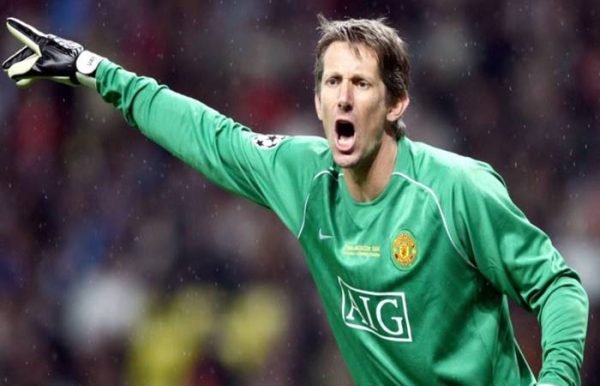
Edwin van der Sar’s career is a testament to longevity, consistency, and success at the highest level. The Dutch goalkeeper enjoyed a remarkable 21-year professional career that saw him excel in multiple leagues and for his national team.
Van der Sar first made his name at Ajax, where he came through the famed youth academy before establishing himself as first-choice goalkeeper. During his time in Amsterdam, he won four Eredivisie titles and the 1995 Champions League, part of Ajax’s golden generation. After successful spells at Juventus and Fulham, he joined Manchester United in 2005, where he enjoyed perhaps his finest years.
At United, Van der Sar won four Premier League titles and another Champions League, forming the backbone of Sir Alex Ferguson’s last great team. His most remarkable achievement came during the 2008-09 season when he set a new world record by going 1,311 minutes without conceding a Premier League goal – a streak that lasted 14 matches.
For the Netherlands, Van der Sar earned 130 caps, appearing in four European Championships and two World Cups. His calm demeanor, excellent positioning, and ability to organize his defense made him one of the most reliable goalkeepers of his generation. After retiring, he returned to Ajax as CEO, demonstrating his continued influence on the game.
7. Peter Schmeichel (Denmark) – The Ultimate Leader
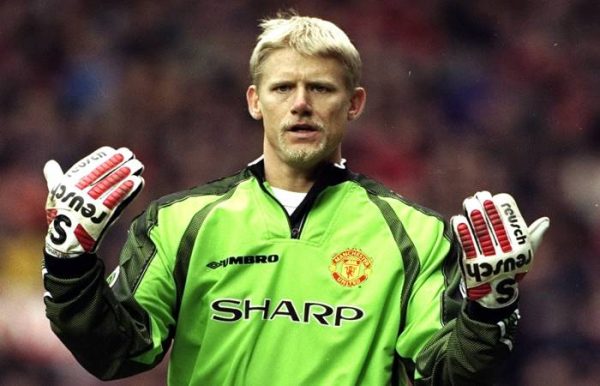
Peter Schmeichel redefined what was expected from a goalkeeper during his dominant career in the 1990s. The Great Dane was more than just a shot-stopper – he was a commanding presence who organized his defense, intimidated opponents, and even contributed to attacks with his legendary long throws.
Schmeichel’s most successful period came at Manchester United, where he was the foundation of Sir Alex Ferguson’s first great team. During eight seasons at Old Trafford, he won five Premier League titles, three FA Cups, and the 1999 Champions League, completing an unprecedented treble in his final season with the club. His performances in the 1999 Champions League semifinal against Juventus and final against Bayern Munich were particularly memorable.
Internationally, Schmeichel was the hero of Denmark’s improbable triumph at Euro 1992. Called into the tournament at the last minute after Yugoslavia’s disqualification, Denmark went on to win the competition with Schmeichel making crucial saves throughout, including a penalty stop in the semifinal against the Netherlands.
What set Schmeichel apart was his unique style. At 6’3″, he dominated his penalty area with an intimidating presence. His starfish save technique became legendary, and his ability to start attacks with quick distribution was ahead of its time. After leaving United, he continued to perform at a high level for Sporting Lisbon, Aston Villa, and Manchester City before retiring in 2003.
6. Petr Čech (Czech Republic) – The Helmeted Hero
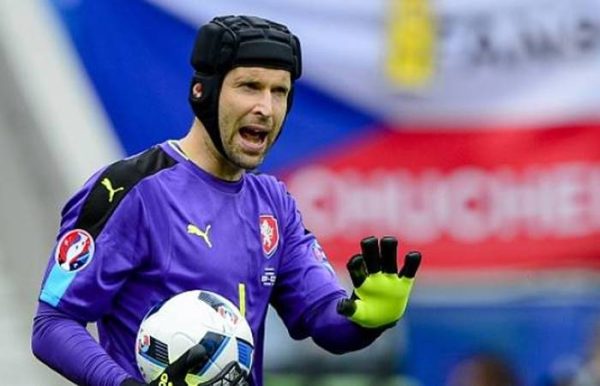
Petr Čech’s career is one of remarkable resilience and consistency at the highest level. The Czech goalkeeper overcame a potentially career-ending injury to establish himself as one of the Premier League’s greatest ever shot-stoppers during his time with Chelsea and Arsenal.
Čech first gained attention at Rennes before moving to Chelsea in 2004, where he quickly established himself as one of the world’s best. In his first season, he set a Premier League record by going 1,025 minutes without conceding a goal, a mark that stood for nearly a decade. His performances were crucial as Chelsea won back-to-back Premier League titles under José Mourinho.
The defining moment of Čech’s career came in 2006 when he suffered a horrific skull fracture in a collision with Reading’s Stephen Hunt. Many feared his career might be over, but he returned wearing his trademark protective headgear and maintained his elite level for another decade. His courage in returning from such a serious injury earned him universal respect.
At Chelsea, Čech won four Premier League titles, four FA Cups, the Champions League in 2012, and the Europa League in 2013. His penalty save from Arjen Robben in the 2012 Champions League final was crucial to Chelsea’s eventual triumph. After moving to Arsenal in 2015, he continued to perform at a high level before retiring in 2019.
Internationally, Čech was a mainstay for the Czech Republic, earning 124 caps and helping his country reach the semifinals of Euro 2004. His Premier League record of 202 clean sheets may never be broken, standing as testament to his incredible consistency over 15 seasons in England.
5. Oliver Kahn (Germany) – The Titan
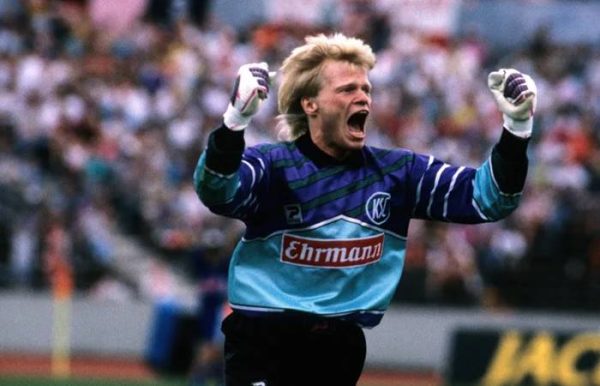
Oliver Kahn stands as one of the most intimidating and dominant goalkeepers in football history. His career, spanning from the early 1990s to 2008, was defined by his aggressive style, incredible reflexes, and unmatched leadership on the pitch. Known as “Der Titan” for his commanding presence, Kahn was the backbone of Bayern Munich and the German national team during their most successful periods.
Kahn’s club career was spent almost entirely at Bayern Munich, where he made over 600 appearances and won eight Bundesliga titles. His crowning achievement at club level came in 2001 when he saved three penalties in the Champions League final shootout against Valencia, securing Bayern’s first European Cup in 25 years. His performances in the 1999 final against Manchester United, where he made several spectacular saves before United’s dramatic late comeback, also showcased his world-class ability.
Internationally, Kahn’s finest hour came at the 2002 World Cup, where he became the first and only goalkeeper to win the Golden Ball as the tournament’s best player. He carried an otherwise average German team to the final with a series of heroic performances, including five clean sheets in the first six matches. His leadership and shot-stopping were so influential that many consider this the greatest individual goalkeeping performance in World Cup history.
What set Kahn apart was his psychological dominance. His intense stare, loud organizing of defenders, and fearless approach made him a nightmare for opposing strikers. Even after conceding, he would immediately rally his team with his vocal leadership. This mentality, combined with his technical excellence in one-on-one situations and penalty saving, makes him one of the most complete goalkeepers ever.
4. Iker Casillas (Spain) – The Captain Fantastic
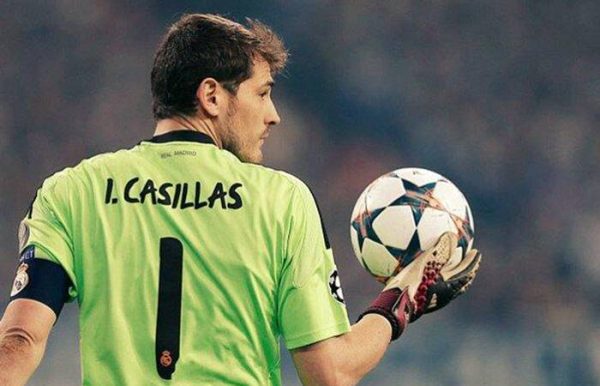
Iker Casillas, affectionately known as “San Iker,” is arguably the most decorated goalkeeper in football history. His career at Real Madrid and with the Spanish national team saw him win every major honor in the game while redefining what it means to be a modern goalkeeper. Casillas combined lightning reflexes with incredible composure under pressure, earning him recognition as one of the greatest big-game players of all time.
Casillas broke through at Real Madrid as a teenager, becoming the youngest goalkeeper to play in a Champions League final when he won the trophy in 2000 at just 19 years old. He would go on to captain Los Blancos for over a decade, winning five La Liga titles and three Champions Leagues. His performances in the 2002 Champions League final against Bayer Leverkusen, where he made several miraculous late saves, cemented his reputation as a clutch performer.
For Spain, Casillas was the foundation of their golden generation that won two European Championships (2008, 2012) and the 2010 World Cup. His save from Arjen Robben in the 2010 World Cup final is one of the most important stops in football history, preserving Spain’s clean sheet in a match they would win 1-0. As captain, his leadership was instrumental in uniting a squad filled with stars from rival clubs.
What made Casillas special was his ability to make difficult saves look routine. His positioning and anticipation were so good that he rarely needed to make spectacular dives. Despite being relatively small for a goalkeeper at 6’1″, he commanded his area with authority and was exceptional at close-range stops. His 16-year international career with Spain, during which he earned a record 167 caps, demonstrates his incredible consistency at the highest level.
3. Manuel Neuer (Germany) – The Sweeper-King
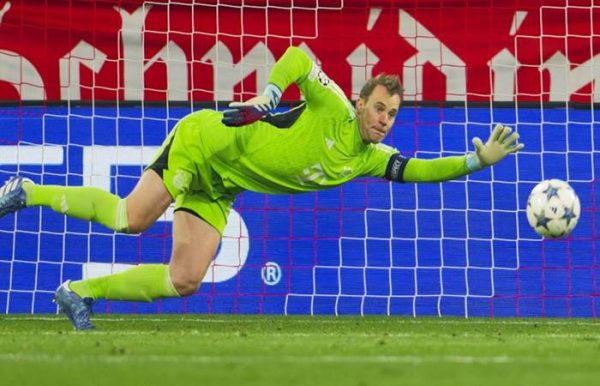
Manuel Neuer has revolutionized goalkeeping in the 21st century, blending traditional shot-stopping with the skills of an outfield player to create the “sweeper-keeper” role. His ability to read the game, combined with his technical skills, has made him the prototype for the modern goalkeeper and one of the most influential players in football history.
Neuer’s career at Bayern Munich has been nothing short of extraordinary. Since joining from Schalke in 2011, he has won 11 Bundesliga titles and two Champions Leagues while redefining the goalkeeper’s role. His performances in Bayern’s 2013 and 2020 Champions League triumphs showcased his unique abilities – in 2020, he completed more passes than some midfielders while also making crucial saves throughout the tournament.
For Germany, Neuer was instrumental in their 2014 World Cup victory, particularly in the knockout stages where his sweeping behind a high defensive line neutralized opposition attacks. His performance in the final against Argentina, where he made several key interventions outside his box, demonstrated why he was considered the world’s best at his peak.
What sets Neuer apart is his complete skill set. He possesses traditional goalkeeping strengths like shot-stopping and commanding his area, but adds elite distribution, comfort with the ball at his feet, and the tactical intelligence to act as an extra defender. His recovery from a career-threatening foot injury in 2017 to return to peak form is a testament to his professionalism and determination. Even in his late 30s, Neuer continues to set the standard for modern goalkeeping.
2. Gianluigi Buffon (Italy) – The Ageless Wonder
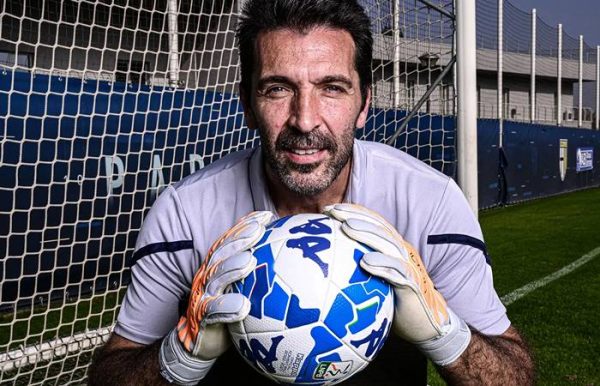
Gianluigi Buffon’s career is a testament to longevity, consistency, and excellence at the highest level. Over 28 professional seasons, Buffon maintained world-class standards while adapting to the changing demands of goalkeeping, making him one of the most respected figures in football history.
Buffon’s career began at Parma in 1995, where his performances earned him a then-world record fee for a goalkeeper when he joined Juventus in 2001. At Juve, he became the backbone of one of Europe’s most consistent teams, winning 10 Serie A titles (though two were later revoked due to Calciopoli). His leadership was crucial as Juventus rebuilt after their 2006 relegation, eventually returning to European prominence.
The 2006 World Cup was Buffon’s crowning achievement. He conceded just two goals in the entire tournament (an own goal and a penalty), keeping five clean sheets as Italy won their fourth title. His save from Zinedine Zidane’s header in the final is one of the most iconic moments in World Cup history.
What makes Buffon extraordinary is how he evolved with the game. Early in his career, he was known for his incredible reflexes and shot-stopping. As he aged, he adapted by improving his positioning, distribution, and organizational skills. His ability to maintain elite performance into his 40s is unprecedented for a goalkeeper. Even after leaving Juventus in 2018, he continued to perform at a high level for PSG and then back at Parma, proving his enduring class.
1. Lev Yashin (Soviet Union) – The Black Spider
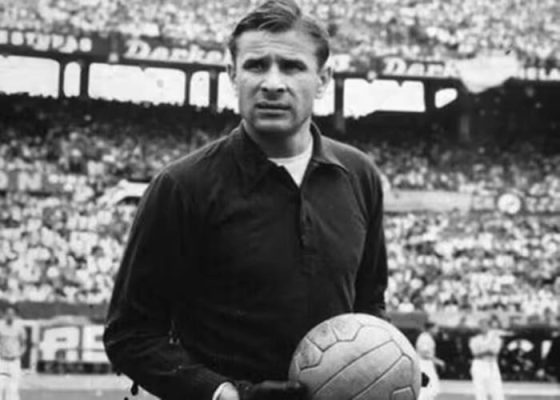
Lev Yashin stands alone as the greatest goalkeeper in football history. His revolutionary approach to goalkeeping in the 1950s and 1960s laid the foundation for modern goalkeeping, while his individual achievements remain unmatched to this day. Nicknamed “The Black Spider” for his all-black kit and seemingly endless reach, Yashin was decades ahead of his time.
Yashin spent his entire club career at Dynamo Moscow, where he won five Soviet league titles and three Soviet Cups. His international career with the USSR was equally impressive, highlighted by their victory at the 1960 European Championship and a semifinal appearance at the 1966 World Cup, where at 36 he was still among the tournament’s best players.
What set Yashin apart was his complete reinvention of goalkeeping. He was the first to truly command his penalty area, coming off his line to claim crosses and through balls. His athleticism and reflexes were extraordinary for his era, but it was his reading of the game and organizational skills that truly revolutionized the position. He pioneered techniques like punching clear crosses and quick distribution to start counterattacks – now standard parts of every goalkeeper’s repertoire.
Yashin’s legacy was cemented in 1963 when he became the only goalkeeper ever to win the Ballon d’Or. His influence extends far beyond his playing career – the annual award for best goalkeeper at the World Cup is named in his honor, and he remains the benchmark against which all goalkeepers are measured. In an era when goalkeepers were expected to simply stop shots, Yashin showed they could dominate games, making him truly the greatest of all time.
Final Verdict: Who’s the GOAT?
The debate over football’s greatest ever goalkeeper ultimately comes down to three legendary figures: Lev Yashin, Gianluigi Buffon, and Manuel Neuer. Each represents the pinnacle of goalkeeping in their respective eras, with unique qualities that set them apart.
Buffon’s case rests on his unparalleled longevity and consistency. To perform at the highest level for 28 seasons, adapting his game as he aged, is an achievement that may never be matched. His leadership and big-game performances, particularly in Italy’s 2006 World Cup triumph, cement his legendary status.
Neuer makes the strongest claim as the most revolutionary goalkeeper since Yashin. His development of the sweeper-keeper role has changed how the position is played at all levels of the game. His trophy haul with Bayern Munich and Germany, combined with his technical innovations, make him the defining goalkeeper of the modern era.
However, Lev Yashin’s legacy stands above all others. In an era when goalkeepers were largely static, Yashin pioneered virtually every aspect of modern goalkeeping. His Ballon d’Or win – still unique among goalkeepers – recognizes his status as not just a great goalkeeper, but one of football’s all-time great players regardless of position. The fact that his influence remains so strong 60 years after his prime is testament to his enduring greatness.
ALSO READ: Top 10 Best NFL Players of All Time (2025 Ranking)
FAQs
Who is the best goalkeeper in the world right now?
The current generation is led by Thibaut Courtois (Real Madrid) and Alisson Becker (Liverpool). Courtois’s performances in Real Madrid’s 2022 Champions League triumph, particularly his heroics in the final against Liverpool, showcased his world-class ability. Alisson combines elite shot-stopping with excellent distribution, making him the complete modern goalkeeper. Other contenders include Ederson (Manchester City) for his revolutionary passing ability and Mike Maignan (AC Milan) who has emerged as one of Europe’s best.
Has any goalkeeper won the Ballon d’Or?
Only Lev Yashin has won the Ballon d’Or, claiming the award in 1963. Since then, several goalkeepers have come close – Manuel Neuer finished third in 2014 after Germany’s World Cup triumph, while Gianluigi Buffon was second in 2006 following Italy’s World Cup victory. The creation of the Yashin Trophy in 2019, awarded to the best goalkeeper each year as part of the Ballon d’Or ceremony, has given goalkeepers more recognition in the modern era.
Who has the most clean sheets in history?
Gianluigi Buffon holds the record for most clean sheets in professional football with over 500 across his career. In terms of verified records, Petr Čech’s 202 Premier League clean sheets is the most in England’s top flight, while Buffon holds the Serie A record with nearly 300. Iker Casillas holds the Champions League clean sheet record with 57, showcasing how these legends dominated their respective competitions. Modern goalkeepers like Manuel Neuer and Thibaut Courtois are climbing these lists but still trail the all-time greats.







 New York Red Bulls vs Inter Miami 1-5 Highlights | MLS
New York Red Bulls vs Inter Miami 1-5 Highlights | MLS  Chelsea vs PSG 3-0 Highlights Download | Club World Cup Final
Chelsea vs PSG 3-0 Highlights Download | Club World Cup Final  Preston vs Liverpool 1-3 Highlights | Club Friendlies
Preston vs Liverpool 1-3 Highlights | Club Friendlies  Inter Miami vs Nashville 2-1 Highlights Download | MLS
Inter Miami vs Nashville 2-1 Highlights Download | MLS